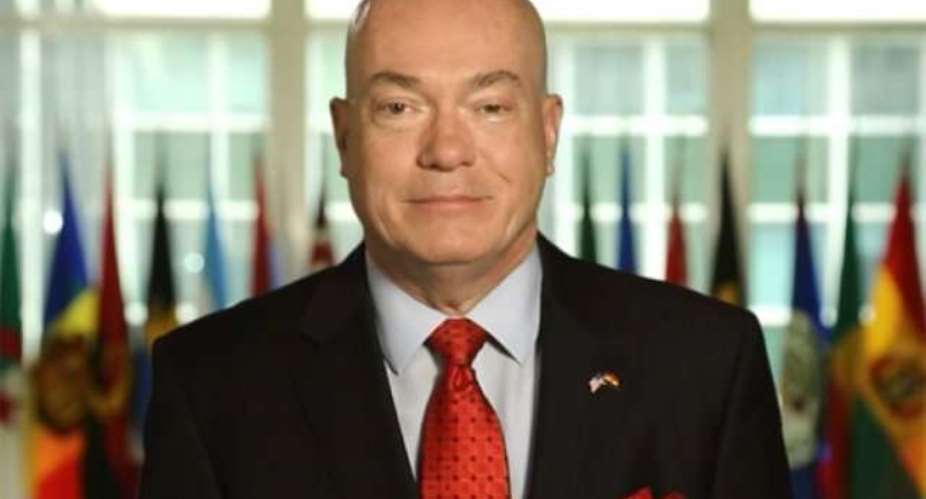Members of Parliament (MPs) and former Presidents of Ghana would not be given any diplomatic courtesies if they apply for US visas for their private business in the United States of America.
Diplomatic courtesies would only be given to them when they are undertaking official assignment and even with that, their trips would have to be endorsed by the Ministry of Foreign Affairs and Protocol Department of Parliament in the case of MPs.
This means that MPs and former Presidents will be queuing for visas as ordinary Ghanaians if they are visiting US for private business.
The US Ambassador to Ghana, Robert Jackson confirmed this when he appeared before the Foreign Affairs Committee of Parliament yesterday to respond to concerns of MPs over the deportation of 63 Ghanaians from the US about a week ago.
The Chairman of the committee, Patrick Yaw Boamah, requested the Ambassador to confirm whether a communication from the Embassy dated November 21, 2016 issuing that the directive was indeed true and he (Ambassador) confirmed it.
DAILY GUIDE has learnt that some MPs, who had decided to travel to the US with their children for private visit, had been denied visas.
Ambassador Summoned
The MPs were also worried about the manner in which some 63 Ghanaians were deported from America on June 14 for alleged offences.
Parliament authorised the Foreign Affairs Committee to investigate the circumstances under which the 63 Ghanaians were deported from US.
The committee therefore invited Ambassador Robert Jackson to ascertain from him how the 63 were deported and why they were in handcuffs when they disembarked from a chartered plane which many Ghanaians have described as abuse of human rights by the US Immigration authorities.
Some members of the committee, particularly the MP for Builsa South, Dr Clement Apaak, were not happy about the way in which their fellow citizens were treated by the US authorities.
But the Ambassador said the US authorities gave the deportees an open option to voluntarily return home after they had been found to have overstayed their visas or entered America illegally.
Some were found to have been engaged in drug cases, assault, theft, forgery and sexual offences.
He explained that when that option to return voluntarily was given to them over a period of time, they refused to come on their own and so the authorities had no option but to force them to return.
According to the US Ambassador, because of the violent nature of the Ghanaian deportees, the authorities decided to handcuff them in order not to be violent towards the immigration officers.
He said as soon as they were put on the chartered plane, the handcuffs were removed and were given their freedom on the plane until the plane touched down at the Kotoka International Airport where they were handcuffed again for the same reason.
He said the deportees were also fed well on the plane.
According to the US Ambassador, 7,000 other Ghanaians, who have either overstayed their visas or entered the country illegally, are being taken through various stages of deportation and would soon be deported to Ghana.
The Ambassador told the committee that the US is welcoming and accommodating to all Ghanaians who use legal means to enter the country and abide by the laws of that country.
Dr Apaak, however, challenged the Ambassador on some aspects of his narration, saying that if indeed the deportees were violent before they boarded the plane they still could have been violent when the handcuffs were removed from their hands while on the plane.
The chairman of the committee, Patrick Yaw Boamah said the committee would also invite the deportees to listen to their side of the story before they could prepare a balanced report and come out with the appropriate recommendations.
By Thomas Fosu Jnr





 Chief arrested for killing soldier at Kasoa over land
Chief arrested for killing soldier at Kasoa over land
 GAF probes soldier’s murder at Kasoa Millenium City
GAF probes soldier’s murder at Kasoa Millenium City
 Ghana steps up effort to pass new Labour law
Ghana steps up effort to pass new Labour law
 AG advises EOCO against money laundering probe into Cecilia Abena Dapaah’s affai...
AG advises EOCO against money laundering probe into Cecilia Abena Dapaah’s affai...
 May Day: I'll prioritise welfare of workers, abolish compulsory retirement age a...
May Day: I'll prioritise welfare of workers, abolish compulsory retirement age a...
 V/R: Adaklu-Tevikpo murder suspect arrested from hideout
V/R: Adaklu-Tevikpo murder suspect arrested from hideout
 Kasoa: Soldier killed by alleged land guards over land dispute — GAF
Kasoa: Soldier killed by alleged land guards over land dispute — GAF
 Fatal shooting of soldier happened at Gomoa East not Kasoa; stop tarnishing our ...
Fatal shooting of soldier happened at Gomoa East not Kasoa; stop tarnishing our ...
 ‘We condemn unprovoked attack in no uncertain terms’ — GAF on fatal shooting of ...
‘We condemn unprovoked attack in no uncertain terms’ — GAF on fatal shooting of ...
 Ghanaians urged to ensure violence free elections on December 7
Ghanaians urged to ensure violence free elections on December 7
